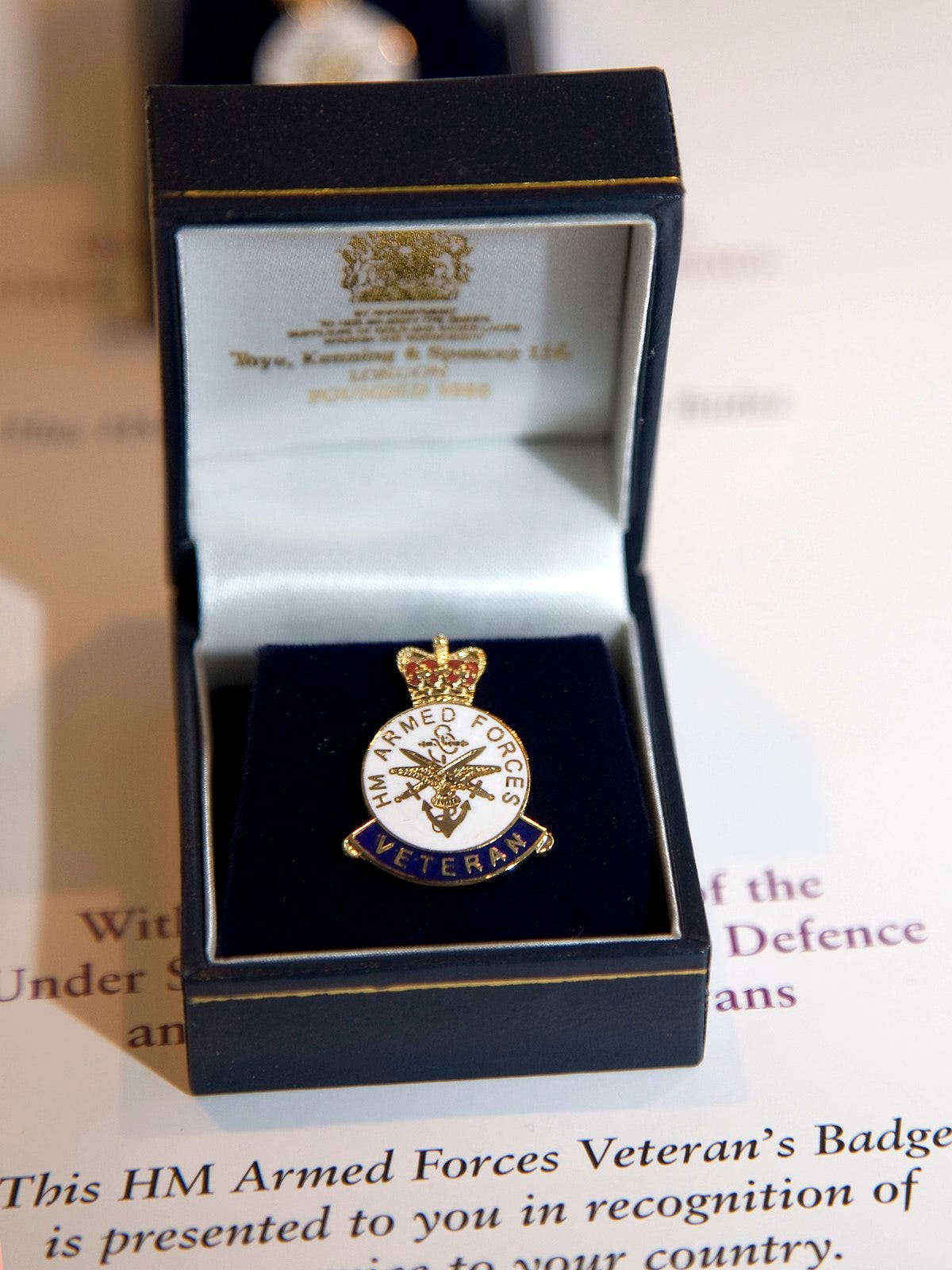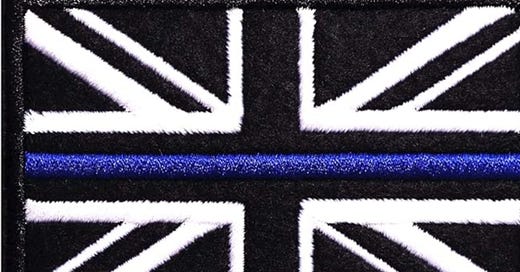EXCLUSIVE: Thin Blue Line Ban Widens as Derbyshire Police Also Prohibit Veterans Badges and Medal Ribbons
It’s now emerged that alongside the Thin Blue Line emblem, officers have also been barred from wearing Armed Forces veteran pins and medal ribbons
Since publishing our first blog about Derbyshire Police banning the Thin Blue Line emblem, more details have come to light—details that paint an even more unsettling picture of just how deep the disconnect has become between frontline officers and senior leadership. This is no longer just about the Thin Blue Line. It is about a culture of control, censorship, and indifference that, based on the emails we’ve received since the article went live, is actively breaking morale and alienating those who serve.
One example stands out above the rest. Officers have been told they can no longer wear not just the Thin Blue Line patch, but also Armed Forces veteran pins and operational medal ribbons—items awarded through service to this country and worn with immense pride. These are not decorative accessories. They carry true meaning. In situations involving vulnerable veterans, especially those experiencing mental health crises & PTSD, these pins have proven to be powerful tools for building trust, connection, and de-escalation.
In situations involving vulnerable veterans, simply seeing that pin helped build instant rapport. It signalled understanding. It built trust. And it opened the door to conversations that might otherwise never happen. During my time on a 999 response team in the East End of London, I can recall incidents involving veterans in crisis who, once they found out I had also served, would only speak to me—not to any of my colleagues.

That shared experience of service cut through everything else. It gave them something to hold on to at a moment when they felt lost. These pins aren’t just about pride. They’re about connection. They’re about recognising and reaching out to those who have put their lives on the line for their country, especially when they’re in need of help. Telling police officers they can no longer wear their veteran’s badge or medal ribbons makes absolutely no sense. It begs the question: what is the real reason behind stopping officers from acknowledging their military service? Because removing this tool from their uniform isn’t just unnecessary. It’s short-sighted and deeply damaging.
It raises the obvious question. Why are officers who risk their lives being told they can no longer wear small, respectful signs of who they are and what they’ve done? Why is the lived experience of service being stripped away in the name of neutrality? Since when did remembrance become controversial? And who, exactly, benefits from this?
Another officer who got in touch spoke of a near-total ban across the board. Charity pins. Military insignia. Advanced driver recognition. BSL interpreter identifiers. Even poppies are now restricted to one specific version and only allowed during November. If it weren’t so serious, it would sound ridiculous. These are not political statements. These are useful, operational, often life-saving identifiers. The idea that any of this is about professionalism falls apart the moment you consider what’s being removed.
Got a story, video, or something on your mind?
Our team—made up of experienced former emergency services and armed forces personnel—wants to hear from you. With 350,000+ monthly views, your story could reach a wide audience.
📩 Email us: contact@emergency-services.news
📲 Seen something on X? Tag us @es_news_ or send us a DM.
This isn’t about upholding standards. It’s about erasing identity.
And while officers are being stripped of their pins and patches, we have to ask: who exactly are these changes meant to serve? The answer, unfortunately, is becoming clearer. It’s hard to believe these decisions are being made to improve policing—because they don’t. Instead, they appear designed to appease the permanently offended. We’re told through the grapevine that it’s about avoiding controversy, about maintaining neutrality. But the anonymous, faceless individuals behind these complaints are anything but neutral.
They’re the same group of self-proclaimed “auditors” and social media agitators who spend their days filming police officers and other emergency workers, deliberately trying to provoke a reaction they can turn into viral content. They claim to stand for liberty, but the moment someone says something mildly offensive, they’re the first to call for help. And thanks to the College of Policing’s guidance, officers are then expected to waste time logging it as a ‘non-crime hate incident’. Yet somehow, it’s still their voices being prioritised.
Meanwhile, officers who quietly get on with the job are being told to remove the symbols that matter most to them. Veterans are being told to hide their service. Skilled officers are being told not to display the very qualifications that can help de-escalate volatile situations. And for what? Because someone might take offence at the idea of being spoken to by a police officer who has also served their country in the military?
Let’s be clear: police officers with a military background are an asset to the Thin Blue Line. They bring with them discipline, experience, and a level of mental resilience that is forged through service. When a veteran officer responds to a call about a man running through the streets with a machete, you know they have the grit and determination to face that threat head-on.
And make no mistake—these threats are real. Social media is flooded with footage of people attacking each other with machetes, swords and knives in broad daylight. This isn’t fearmongering. It’s the reality on Britain’s streets, no matter how much some politicians might try to downplay or deflect from it.
Let’s not forget—the Thin Blue Line isn’t unique. Paramedics wear the Thin Green Line. Firefighters wear the Thin Red Line. These emblems aren’t controversial. You don’t see people waving GoPros in their faces, demanding they take them off. So why is it only the police being singled out? The answer is as obvious as it is uncomfortable.
And if senior officers don’t have the clarity or courage to defend these symbols and push back against those trying to twist their meaning, then it’s fair to ask whether they’re still fit to lead. Policing in this country is built on consent. But that principle must apply within the job too. Consent cannot just be about the public.
It must also include the officers who serve. Because without them, there is no policing. Remove the men and women willing to wear that uniform, and this country would fall apart within 24 hours. That’s not dramatic. That’s the reality.
We’ve been told that morale in Derbyshire Constabulary is at an all-time low. Officers say they feel ignored, abandoned, and stripped of their professional identity by leadership teams more focused on optics and shielding themselves from criticism than standing up for their own staff. Those aren’t my words—they’re theirs. And this goes far beyond the Thin Blue Line patch. Officers are now being told they can’t wear veteran pins, operational ribbons, or even symbols of their specialist skills—decisions that make no operational sense and only deepen the divide between those on the front line and those calling the shots.
Some may argue this is about maintaining a standardised uniform, that everyone should look the same. But as we’ve already highlighted in this blog, especially in the case of the Armed Forces veteran pin, wearing that small badge can make a meaningful difference. It’s not just about identity, it’s about effectiveness. It can help defuse tense situations, build rapport with vulnerable individuals, and save lives.
It’s also worth pointing out that we are one of the only police forces in the Western Hemisphere that does not allow its officers to wear the national flag. In the United States, police officers proudly wear the Stars and Stripes on their uniform. In Canada, they wear the Maple Leaf. The same applies in France and in countless other nations where police officers are encouraged to display symbols of national pride. And yet here in the UK, for reasons that defy logic and common sense, we’re told that even the subtlest symbol—whether a flag, a line, or a ribbon—is suddenly too controversial to be seen in public. The idea that proudly wearing your own national identity could offend someone is as absurd as it is insulting.
These decisions need to be reversed. Not just for the sake of symbolism, but for the sake of operational effectiveness, mental health response, and public trust.
To the people who reached out, your voices matter. And we will keep publishing them.
If you believe in advert-free journalism that stands up for emergency services workers and gives them a platform when others won’t, consider becoming a paid subscriber today.
Opinion: What’s Happening to British Policing Should Worry All of Us
I left the police - and the military - a few years ago, but what I’m watching unfold now is deeply unsettling. When officers are being told they can’t wear a memorial emblem or display the fact they served in the Armed Forces, we’re not talking about professionalism anymore—we’re talking about erasing identity, pride, and lived experience.
And all of this is happening while violence on our streets is rising and public trust is hanging by a thread. If you care about what happens next in British policing, this is something you need to read.
Keep reading with a 7-day free trial
Subscribe to ESN Report to keep reading this post and get 7 days of free access to the full post archives.



